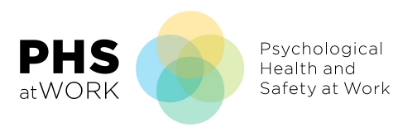WHAT IS PSYCHOLOGICAL HEALTH AND SAFETY, AND WHY IS IT IMPORTANT?
We are all familiar with the need to protect physical health and safety in the workplace; it is enshrined in Occupational Health and Safety (OH&S) regulations, legislation and business practice. Enormous progress has been made over the last 100 years in decreasing rates of accidents and illness related to risks posed by workplace conditions or worker behaviours.
A NEW REALIZATION HAS DAWNED
With advancements in workplace mental health, a new realization has dawned: the protection of workers also includes attending to their psychological (mental) health and safety.
Psychological health and safety ideology is about protecting the psychological health of employees. A psychologically healthy and safe workplace promotes employees’ psychological well-being and works to prevent harm to employee psychological health due to negligent, reckless or intentional acts.
WHAT IS PSYCHOLOGICAL HEALTH AND SAFETY?
Psychological health includes our personal ability to think, feel and behave in a manner that allows us to function effectively in our work environments, personal lives, and community.
Psychological safety deals with the risk of injury to the mental well-being an employee might experience. Improving the psychological safety of a workplace involves taking appropriate precautions to prevent injury or danger to employee’s psychological health.
WHY IS PSYCHOLOGICAL HEALTH AND SAFETY IMPORTANT?
It is important to understand psychological health problems occur on a spectrum, from mild psychological difficulties on one end of the spectrum - to severe psychological health problems on the other. The most common psychological health problems in the workplace are anxiety and depression.
Individuals dealing with just one of the following issues; interpersonal workplace conflict, intercultural conflict, workplace harassment or violence, poor design of work or jobs, poor communication, change -management and technological, shift work, could find themselves progressing from having mild psychological difficulties (unpleasant emotional states like worry or sadness) to a psychological health condition (depression or anxiety).
Work experiences that are perceived to be psychologically unsafe can place anyone of us on the following 1-5 spectrum.
Unpleasant Emotional States (sadness, worry) a normal part of human experience fleeting/temporary
Distress more intense, unpleasant emotions often tied to acute stressors/changes
Chronic Stress, ongoing and persistent (which often impacts physical health)
Psychological Health Symptoms - sub-threshold
Psychological Health Condition - clinically diagnosable conditions.
Most Important, appropriate psychological health and safety services can prevent escalation to illness.
Dr. Joti Samra, R.Psych. Faculty of Health Sciences, Simon Fraser University
WHAT DOES THE RESEARCH TELLS US?
The Centre for Applied Research in Mental Health & Addiction (CARMHA) has developed a comprehensive database that provides a clear picture of why addressing psychological health and safety is important and the employer’s responsibility toward the creation of psychological health and safety within the workplace. The links below provide a summary of their data.
There is research and practical evidence of the impact of workplace factors on employee mental health.



